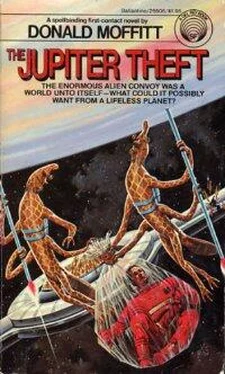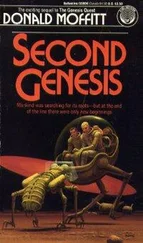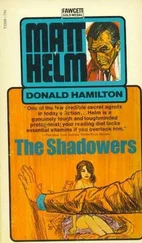“Why?” Jameson typed. “Why do you need the large planet?”
The two Cygnans hesitated. Their stumpy eye polyps twitched. They were facing a problem about vocabulary.
“Jameson eats the green food made from growing things,” Triad skirled. “The small animal from Earth eats the white liquid. Then Jameson has the power to move. Then the animal has the power to move. Does Jameson understand?”
“Jameson understands,” he tapped out on the keys.
“An engine must eat. Then this place may move.”
Fuel. They were talking about fuel. A couple of quick exchanges and he had the Cygnan word for it.
Tetrachord spoke up. “The fuel which our engines eat is the mother-of-matter.”
He got it right away. Hydrogen!
They were using Jupiter for fuel. To the Cygnans, that was all Jupiter was good for. They’d simply dropped in on a handy solar system to tank up.
Gas giants were common throughout the universe. They were a necessary consequence of planetary formation. Most of those that had been detected, like the superjovian companions of 61 Cygni and CIN 2347, were considerably more massive than Jupiter itself. Using them for refueling stops must be a convenient way to star-hop.
Mother-of-matter—that was as good a description as any for the most basic of the elements. Rather poetic, in fact.
Jupiter was composed almost entirely of hydrogen. The giant planets, with their tremendous gravitational strength, were able to hang on to the light gases that had given them birth. Oh, the atmosphere was placed with helium and with such impurities as water, methane, and ammonia. And somewhere at the center of that vast slush ball, like a cherry pit, was a small rocky core about the size of the planet Earth.
But mostly it was hydrogen—an atmosphere hundreds of miles deep, squeezed gradually by its own unsupportable weight until it began to behave like a liquid. There was no clear boundary. It became an ocean without a surface, some twelve thousand miles deep, an ocean in which the planet Earth could have sunk without a trace. It was also an ocean without a bottom. At that depth, under a pressure of three million Earth atmospheres, the thickening syrup of molecular hydrogen underwent another transformation. Its molecules dissociated into atoms. It turned into a metallic form never seen on Earth: a dense fluid that could conduct electricity.
It would make a bottomless reservoir of hydrogen fuel. Siphon off the upper atmosphere and the lower layers, released from pressure, would boil up into a gas again. Drain the oceans that weighed on that strange ball of metallic hydrogen and the viscid stuff would turn into the molecular form, in turn boiling off as a gas at its surface.
Jupiter would make a great fuel tank. How close to the speed of light could you get before you used it up?
Jameson looked over at the triple image of Jupiter on the circular screens. How much of Jupiter was gone already? It was impossible to guess. The Cygnans could have stolen a mass equal to several Earths without making an appreciable dent in it. And as the surface pressure let up, what was left of Jupiter would expand. To Jameson’s naked eye there was no difference in Jupiter’s size.
Jameson’s fingers rippled over the keys. The Moog cleared its electronic throats and said, “How? How is it possible for you to do this thing?”
“The planet you call Jupiter will fall,” Tetrachord repeated for the fourth time. “And we will fall after it.”
“Yes, but what will it fall toward? ” Jameson asked, getting desperate. It wasn’t easy discussing orbital mechanics in babytalk.
“It will fall to that-which-pulls,” the Cygnan tweetled, “when that-which-pulls grows heavy enough.”
Jameson clenched his big fists in frustration. They were going around in circles. Any more of this and the Cygnans would give up on him, as they always did when the going got tough. He might never have another chance to reopen the subject.
He composed his thoughts and ran his hands over the keys again.
“Where is that-which-pulls?”
Tetrachord gestured vaguely toward the bulk of Jupiter on the screens. “You see it,” he said.
What did that mean? Was Jupiter supposed to fall toward itself? “Give me a closer look,” Jameson said. Tetrachord twisted a serpentine neck toward the triple screens and warbled at them. The console evidently could be voice-activated as well as manually controlled by the little tuned wires.
The view of Jupiter enlarged. The screens zoomed in on a segment of the hoop of glowing wire that circled the giant planet above the cloudtops. A rim of clouds stretched from Jupiter to the hoop like a hat brim.
The zoom stopped. Jameson was looking at a sash of light stretching in triplicate across the screens.
The close-up of a piece of halo told him nothing. “I see that the light draws hydrogen (‘mother-of-matter’) from Jupiter. But where does the hydrogen go? How is it stored?”
That earned him a lot of disconcerted whistling. “To store hydrogen has not-meaning. It is to be eaten by that-which-pulls.”
Back to square one. Exasperated, Jameson said, “I don’t see anything there except light.”
They seemed puzzled that Jameson couldn’t see what they were showing him. They held a bagpipy conference about it. Then Tetrachord made some adjustments at the keyboardlike row of fretted miniature guitar necks.
As Jameson watched, the glowing bracelet that circled Jupiter began to flicker. It became a series of fireballs chasing one another’s tails. The fireballs finally slowed so that he could see them. What he saw was a herringbone frieze of overlapping shapes. Through the ghost images he could make out the basic form of the thing.
It was a strobe effect. Jameson was looking at a frozen frame of the object that circled Jupiter at a blurring speed that by now must be an appreciable fraction of the speed of light.
The Cygnans needed no such visual coddling, he suddenly realized. The neurons in their visual pathways must be able to fire selectively, at millions of times per second, as naturally as a human being might squint for better focus. They carried their own built-in strobe flash.
“That-which-pulls,” Triad hummed.
It was one of their probes—an elongated pyramid like a flat-sided spike. It was doing nothing but circle Jupiter, again and again, picking up speed with each circuit.
“Does Jameson know that as a thing goes faster, it grows heavier?” Tetrachord asked.
By God, the creature was quoting the theory of relativity at him! What Cygnan Einstein, thousands of years in the past, had arrived at the great keystone equation governing the increase of mass with velocity? Jameson dug into his memory for what he had learned at his Academy classes long ago.
“Jameson knows that if a thing would go as fast as light is fast, its weight would be…”
Damn! What was the Cygnan word for “infinite”? He’d never learned it. Perhaps there wasn’t one. And did they understand “weight” to mean “mass”? And how did you express the concept of a square root in Cygnanese? The square root of one minus the square of velocity divided by the square of the speed of light—how did you go about saying a thing like that in pidgin? Maybe the Cygnans didn’t use square roots, either. Perhaps they arrived at their results in an entirely different fashion—like Russian multiplication.
He stared at the little triangular probe on the screens. Could a thing that small really move the biggest planet in the solar system? His instincts said no. Einstein said yes.
What was its mass by now? Enough to make the outer fringes of the Jovian atmosphere fall into it. Jameson could see the threadlike stem of a whirling tornado sucked into the needle craft—a tornado that was whipped round the circumference of Jupiter at thousands of miles per second, unwinding the giant planet like a ball of twine.
Читать дальше












